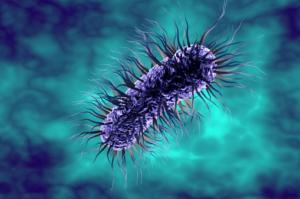Gut survival: a new E. coli protein player
Posted on August 29, 2012 by Greg Potter, Dalhousie University, Canada
During a routine trip to the supermarket, consumers today can easily purchase foods sourced from all corners of the globe. Our supply does not come without its share of problems though; food safety has become harder to control with the increasingly complex food trade network. Consumption of contaminated foods can lead to widespread sickness and even deaths and food-borne illness costs the UK an estimated £2 billion each year. In many instances, the bacteria identified as the cause of these illnesses are strains of Escherichia coli.

Most forms of E. coli are harmless to humans, and form part of the normal gut flora of warm-blooded animals. E. coli O157:H7, however, is not one of these harmless strains. This bacterium can cause severe diarrhoea, and in some young children and elderly people, infection leads to a deadly condition called hemolytic uremic syndrome.
E. coli O157:H7 typically enters the body when contaminated foods are consumed. Before the bacteria can multiply, they must survive the acidic environment in the stomach and bind to cells in the large intestine. Bacteriologists studying E. coli O157:H7 recently investigated a new adhesion protein named YadK that is believed to improve chances of bacterial survival and growth following passage through the stomach. The research paper is published in the September issue of the journal Microbiology.
Initial genetic studies indicated that E. coli O157:H7 started producing higher levels of certain proteins during acid stress. The researchers found that in acidic conditions twice the amount of YadK was produced compared to non-acidic conditions. Immunological techniques were employed to inhibit contact between YadK from acid-stressed E. coli O157:H7 and intestinal cell cultures. This made the bacteria significantly less able to attach to intestinal cells.
Until now, YadK had not been recognized as an important protein for E. coli O157:H7 cell adhesion following acid stress. However, this study indicates that this protein may help E. coli O157:H7 to initiate infection once inside the human body. The safety of our food supply relies strongly on the work of microbiologists conducting basic scientific research on bacterial proteins such as YadK. Ultimately, this type of research has the potential to lead to more effective microbial detection techniques in our increasingly complex food chain, and strategies to prevent food-borne pathogens entering the food chain in the first place.
